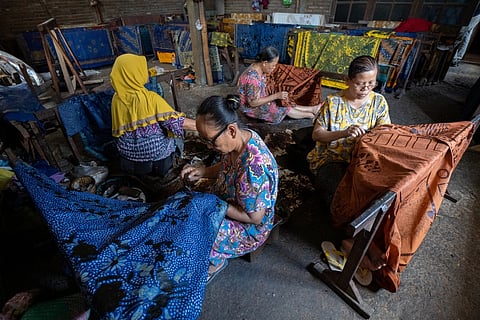
- Destinations
- Experiences
- Stay
- What's new
- Editor’s Picks
- Responsible Tourism
- CampaignsCampaigns
- Subscribe

Indonesia is a fascinating country that offers a wealth of experiences and attractions for travellers. As an Indian citizen, you can stay in Indonesia visa-free for up to 30 days, making it an affordable and convenient destination. This Southeast Asian country is home to more than 17,000 islands, each with its unique charm, beauty, and culture. Apart from the verdant natural beauty, the island nation has rich cultural traditions that you must experience on your holiday. We have put together a list of curated experiences, from the fairy-tale like houses of Wae Rebo, a small village of the Manggarai ethnic group to the long drawn out funeral ceremonies of the Toraja indigenous group to participating in community batik workshops, masked dances and more.
Setu Babakan Betawi Cultural Village is located about an hour's drive from Soekarno-Hatta International Airport, in Jagakarsa, South Jakarta. Here, you can experience the culture of the Betawi community, from giant Betawi effigies called ondel-ondel, to traditional Betawi omelet with sticky rice known as kerak telor, and even a herbs and spices-based beverage called bir pletok. The cultural village offers several activities for visitors to enjoy, including the unique mask or topeng dance called Blantek, which combines Blenggo Dance, Pencak Silat, and is accompanied by the traditional music of Rebana Biang in the background. After watching the vibrant dance, you can then buy yourself a bir pletok drink. The 289-hectare cultural village is divided into five zones, which consist of a three-story Betawi Museum, amphitheater, traditional houses, workshop areas, and other public facilities.
Indonesia boasts a rich tradition of exquisite handwoven textiles. A mere 25 kilometers from Mataram, Sukarara in Central Lombok stands as one of the premier centres of hand-weaving in Indonesia. Here, visitors can marvel at the meticulous production process, from the threading of looms to the creation of intricate fabrics. You can witness skilled craftswomen delicately weaving threads, or even try your hand at the art of weaving. The weaving community in Sukarara offers an unforgettable experience, with numerous workshops showcasing and selling the village's woven products. The locals wear vibrant traditional Sasak clothing, including the striking crown, sling belt, and shirt. Notably, the renowned songket, a finely-patterned textile intricately woven with threads of gold and silver, is a true testament to the artistry of Sukarara.
You may have heard of Mexico's Day of the Dead, but not many people are familiar with the ma'nene ritual. This ritual takes place in Tana Toraja, also known as Torajaland, located in South Sulawesi. The area is home to a beautiful valley surrounded by misty mountains. The Toraja indigenous group is renowned for their elaborate, sometimes weeks-long funeral ceremonies. Every three years, in an August ceremony known as ma'nene, or the ritual of cleaning corpses, the dead are exhumed to be washed, groomed, and dressed in new clothes. For the Toraja people, ma'nene is an important part of their belief system, aluk todolo, which roughly translates to 'way of the ancestors'. This belief system emphasizes strong ties to deceased relatives, and dictates that the deceased remain a constant presence in their families' lives.
Have you heard of the hobbit houses in New Zealand? If you love them, you'll be amazed by the ones in the ancient Wae Rebo village on the island of Flores. Situated 1,200 meters above sea level, deep in the Todo rainforest, Wae Rebo is a small village of the Manggarai ethnic group and accessible by a hike up a mountain. The traditional houses are tall, covered in thatch, and fairytale-like with their cone-shaped structure. The 1,500-year-old village recently received the Top Award of Excellence from UNESCO in the 2012 UNESCO Asia Pacific Heritage Awards. This remarkable village was acknowledged for its exceptional efforts in reconstructing the traditional Mbaru Niang house through community collaboration, fostering a sustainable tradition and enhancing the welfare of the village. Immerse yourself in the natural beauty of the village, surrounded by picturesque mountains and the lush Todo forest. Discover a rich variety of orchids, ferns, and the delightful melodies of songbirds. Experience a true escape from the digital world, as there is no mobile coverage, allowing you to fully embrace the tranquility. The electricity, available from 6 to 10 pm, enhances the sense of connection with nature. Embrace the cool, invigorating air, especially during the dry season, and be sure to pack a jacket for your visit.
Indonesia boasts a rich tradition of producing batik, with each region showcasing its own unique style. The majority of batik in Indonesia is still handmade in small local workshops, rather than in factories. Java batik, in particular, is renowned. Visitors have the opportunity to participate in a community batik workshop at one of the small production houses and learn from experts. They can observe the intricate process of creating batik, from designing the patterns and understanding their meanings, to carefully applying hot wax to the fabric, and ultimately producing the final product.
